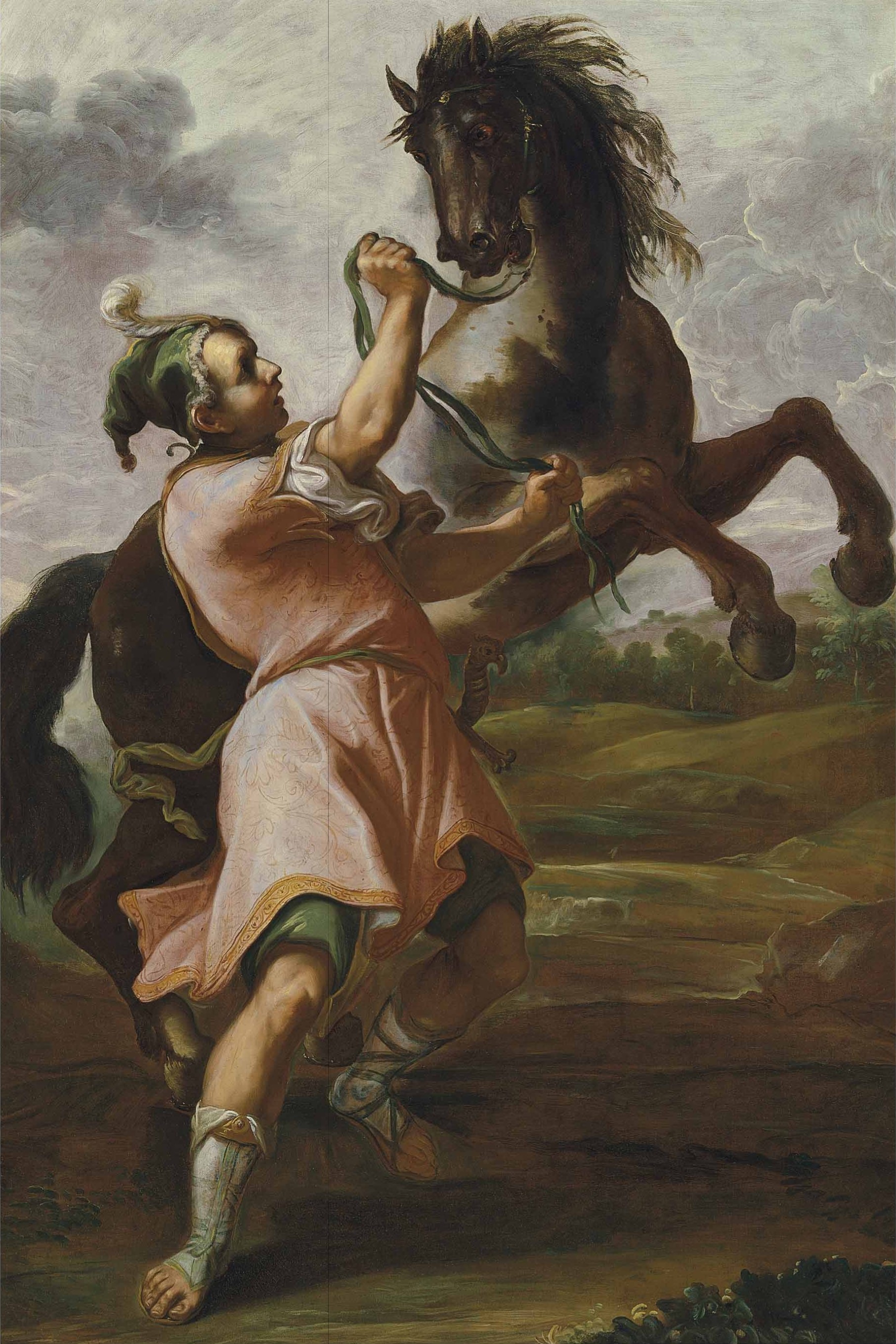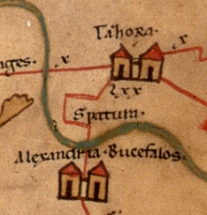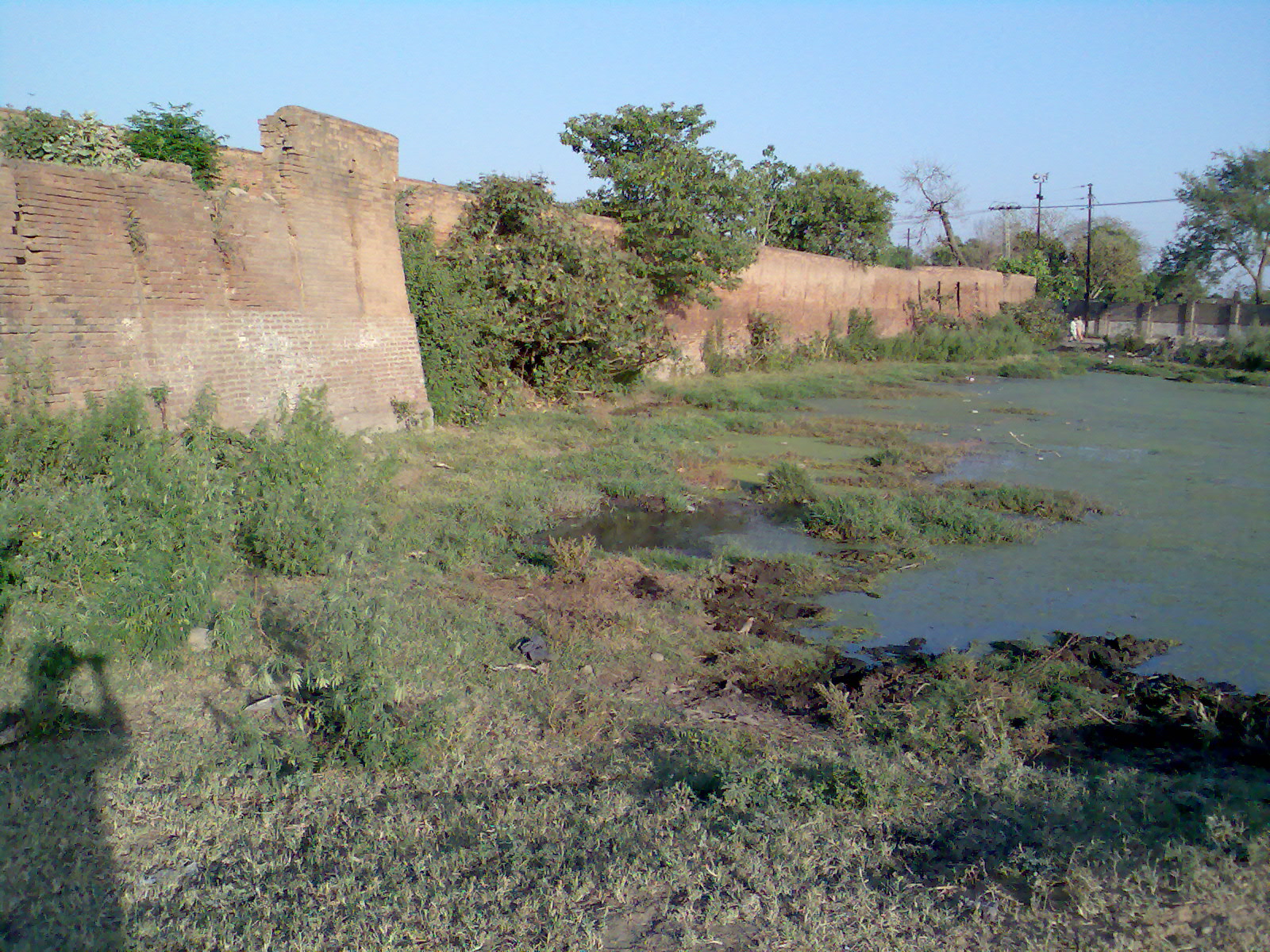|
Bucephalus
Bucephalus or Bucephalas (; grc, Βουκεφάλας, ; – June 326 BC) was the horse of Alexander the Great, and one of the most famous horses of classical antiquity. Ancient historical accounts state that Bucephalus' breed was that of the "best Thessaly, Thessalian strain", and that he died in what is now Punjab, Pakistan, Punjab, Pakistan, after the Battle of the Hydaspes in 326 BC. The horse was reportedly buried at Jalalpur Sharif, a small town situated a short distance to the southwest of Jhelum. Another account states that Bucephalus is buried in Phalia, a town located near the city of Mandi Bahauddin, which was named after him (Alexandria Bucephalous). Bucephalus was named after Bucephalus (brand), a branding mark depicting an ox's head on his haunch. Taming of Bucephalus A massive creature with a massive head, Bucephalus is described as having a black coat with a large white star on his brow. He is also supposed to have had a "Horse markings#Other ... [...More Info...] [...Related Items...] OR: [Wikipedia] [Google] [Baidu] |
Alexandria Bucephalous
Alexandria Bucephalous (also variously known as Alexandria Bucephalus, Alexandria Bucephala, Bucephala, or Bucephalia), was a polis, city founded by Alexander the Great in memory of his beloved horse Bucephalus."The History of Alexander the Great", Pseudo-Callisthenes, Ernest Alfred Wallis, 1889, p.161 (''see below:'' References). Founded in May 326 BC, the town was located on the Hydaspes (Jhelum River), east of the Indus River. Bucephalus had died after the Battle of the Hydaspes in 326 BC. The garrison was settled with Greeks, Greek and Persian people, Iranian veterans and Pauravas locals. It had large dockyards, suggesting it was intended as a Emporia (ancient Greece), center of commerce. Alexandria Bucephalous remained a significant centre for some time, as it is mentioned in the ''Metz Epitome'' and shown on the late Ancient Rome, Roman ''Tabula Peutingeriana, Peutinger Table''. The 1st-century ''Periplus of the Erythraean Sea'' reads: Around 17 cities were named with th ... [...More Info...] [...Related Items...] OR: [Wikipedia] [Google] [Baidu] |
Bucephalus (brand)
Bucephalus ( grc, Βουκέφαλος, , ox-headed, from ', "ox", and ', "head") was a type of branding mark used on horses in ancient Greece. It was one of the three most common, besides '' Ϻ'', San, and '' Ϙ'', Koppa. Those horses marked with a San were called ''Σαμφόραι'', Samphórai; those with a Koppa, ', Koppatíai; and those with an ox's head, ''Βουκέφαλοι'', Bucéphaloi. This mark was stamped on the horse's buttocks and its harnesses, judging by the scholia on Aristophanes's ''The Clouds'', Hesychius, and other works. Alexander the Great's horse was named Bucephalus Bucephalus or Bucephalas (; grc, Βουκεφάλας, ; – June 326 BC) was the horse of Alexander the Great, and one of the most famous horses of classical antiquity. Ancient historical accounts state that Bucephalus' breed was tha ... after this brand on its haunch. References {{1728, title=Bucephalus Horse history and evolution Identification of domesticated an ... [...More Info...] [...Related Items...] OR: [Wikipedia] [Google] [Baidu] |
Phalia
Phalia (Urdu ) is a city and headquarters of Phalia Tehsil of Mandi Bahauddin District, Punjab, Pakistan. History Alexander the Great and his army crossed the Jhelum in July 326 BC at the Battle of the Hydaspes River where he defeated the Indian king Porus. According to Arrian (''Anabasis'', 29), he built a city on the spot whence he started to cross the river Hydaspes now Jhelum River, which he named Bukephala or Bucephala to honour his famous and loyal horse Bukephalus or Bucephalus. It is thought that ancient Bukephala was near the site of modern Jhelum City but that is wrong. Phalia was named after Bucephalus on the name of the Alexander's dead horse and presently a tehsil of Mandi Bahauddin District. The Alexander while forwarding from Taxila opted alternate way despite using traditional route i.e. today's GT road and built two cities on opposite banks of the river Hydaspes en route between Bhera and Mong. In AD 997, Sultan Mahmud Ghaznavi, took over the Ghaznav ... [...More Info...] [...Related Items...] OR: [Wikipedia] [Google] [Baidu] |
Jalalpur Sharif
Jalalpur Sharif ( ur, ) is a small town located in Jhelum, and is a Union Council of Pind Dadan Khan Tehsil in Jhelum District, Punjab province, Pakistan. It is located at 32°39'34N 73°24'19E, making it approximately 50 km south west of the city of Jhelum. It is well known for The Alexender's Monument & one big Shrine. History Jalalpur modern name came from the renaming of its ancient name, , by Malik Darwesh Khan Janjua who was a high-ranking general of the Imperial Mughal Army under Emperor Jalaluddin Muhammad Akbar’s reign. It is stated that Malik Darwesh ordered the renaming of Girjak (part of his extended kingdom) to Jalalpur, when Emperor Akbar visited him. This was done in honour of the Emperor and the Janjua family's relationship. Jalalpur at this point was a flourishing centre of trade for the region. The history of the region dates back to 326 BC when Alexander the Great and his troops camped at Jalalpur Sharif, located on the right bank of th ... [...More Info...] [...Related Items...] OR: [Wikipedia] [Google] [Baidu] |
Battle Of The Hydaspes
The Battle of the Hydaspes was fought between Alexander the Great and king Porus in 326 BC. It took place on the banks of the Jhelum River (known to the ancient Greeks as Hydaspes) in the Punjab region of the Indian subcontinent (modern-day Punjab, Pakistan). The battle resulted in a Greek victory and the captivity of Porus. Large areas of Punjab were absorbed into the Macedonian Empire, and later Porus became reinstated by Alexander as a Satrap. Alexander's decision to cross the monsoon-swollen river—despite close Indian surveillance—in order to catch Porus's army in the flank has been referred to as one of his "masterpieces". Although victorious, it was also the most costly battle fought by the Macedonians. The fierce resistance put up by Porus and his men won the respect of Alexander who, after the battle, asked Porus to become one of his satraps. The battle is historically significant because it resulted in the exposure of ancient Greek political and cultural influe ... [...More Info...] [...Related Items...] OR: [Wikipedia] [Google] [Baidu] |
Jhelum
Jhelum ( Punjabi and ur, ) is a city on the east bank of the Jhelum River, which is located in the district of Jhelum in the north of Punjab province, Pakistan. It is the 44th largest city of Pakistan by population. Jhelum is known for providing many soldiers to the British Army before independence, and later to the Pakistan armed forces – due to which it is also known as ''City of Soldiers'' or ''Land of Martyrs and Warriors''. Jhelum is a few miles upstream from the site of the ancient Battle of the Hydaspes between the armies of Alexander and King Porus. Possibly Jhelum City was the capital of Porus' Kingdom, Paurava. A city called Bucephala was founded nearby to commemorate the death of Alexander's horse, Bucephalus. Other notable sites nearby include the 16th-century Rohtas Fort, the Tilla Jogian complex of ancient temples, and the 16th-century Grand Trunk Road which passes through the city. According to the 2017 census of Pakistan, the population of Jhelum was 19 ... [...More Info...] [...Related Items...] OR: [Wikipedia] [Google] [Baidu] |
Alexander The Great
Alexander III of Macedon ( grc, wikt:Ἀλέξανδρος, Ἀλέξανδρος, Alexandros; 20/21 July 356 BC – 10/11 June 323 BC), commonly known as Alexander the Great, was a king of the Ancient Greece, ancient Greek kingdom of Macedonia (ancient kingdom), Macedon. He succeeded his father Philip II of Macedon, Philip II to the throne in 336 BC at the age of 20, and spent most of his ruling years conducting a lengthy military campaign throughout Western Asia and ancient Egypt, Egypt. By the age of thirty, he had created one of the List of largest empires, largest empires in history, stretching from Greece to northwestern Historical India, India. He was undefeated in battle and is widely considered to be one of history's greatest and most successful military commanders. Until the age of 16, Alexander was tutored by Aristotle. In 335 BC, shortly after his assumption of kingship over Macedon, he Alexander's Balkan campaign, campaigned in the Balkans and reasserted control ... [...More Info...] [...Related Items...] OR: [Wikipedia] [Google] [Baidu] |
2001 In Literature
This article contains information about the literary events and publications of 2001. – Opening sentence, Ian McEwan, ''Atonement'' Events *February 15 – The author Michael Crichton signs a new deal with HarperCollins Publishers that reportedly earns him $40 million for two books. *April 1 – The BookCrossing scheme for leaving books for strangers to find is launched. * April 13 – The film version of Helen Fielding's 1996 novel ''Bridget Jones's Diary'' has uncredited cameo roles as themselves for Salman Rushdie, Julian Barnes and Jeffrey Archer, at a literary party. *July 19 – The English popular novelist and politician Jeffrey Archer, having been found guilty of perjury in a libel trial, is sentenced to imprisonment. *September 19 – Amiri Baraka reads his poem "Somebody Blew Up America?" at a poetry festival in New Jersey, eight days after the September 11 attacks. *December 10 – The live-action film version of J. R. R. Tolkien's '' The Lord of the Rings: The F ... [...More Info...] [...Related Items...] OR: [Wikipedia] [Google] [Baidu] |
Modern Library
The Modern Library is an American book publishing imprint and formerly the parent company of Random House. Founded in 1917 by Albert Boni and Horace Liveright as an imprint of their publishing company Boni & Liveright, Modern Library became an independent publishing company in 1925 when Boni & Liveright sold it to Bennett Cerf and Donald Klopfer. Random House began in 1927 as a subsidiary of the Modern Library and eventually overtook its parent company, with Modern Library becoming an imprint of Random House. Recent history The Modern Library originally published only hardbound books. In 1950, it began publishing the Modern Library College Editions, a forerunner of its current series of paperback classics. From 1955 to 1960, the company published a high quality, numbered paperback series, but discontinued it in 1960, when the series was merged into the newly acquired Vintage paperbacks group. The Modern Library homepage states: In 1992, on the occasion of the Modern Library ... [...More Info...] [...Related Items...] OR: [Wikipedia] [Google] [Baidu] |
Philip II Of Macedon
Philip II of Macedon ( grc-gre, Φίλιππος ; 382 – 21 October 336 BC) was the king ('' basileus'') of the ancient kingdom of Macedonia from 359 BC until his death in 336 BC. He was a member of the Argead dynasty, founders of the ancient kingdom, and the father of Alexander the Great. The rise of Macedon—its conquest and political consolidation of most of Classical Greece during his reign—was achieved by his reformation of the army (the establishment of the Macedonian phalanx that proved critical in securing victories on the battlefield), his extensive use of siege engines, and his utilization of effective diplomacy and marriage alliances. After defeating the Greek city-states of Athens and Thebes at the Battle of Chaeronea in 338 BC, Philip II led the effort to establish a federation of Greek states known as the League of Corinth, with him as the elected hegemon and commander-in-chief of Greece for a planned invasion of the Achaemenid Empire of Persia. Ho ... [...More Info...] [...Related Items...] OR: [Wikipedia] [Google] [Baidu] |
Arthur Hugh Clough
Arthur Hugh Clough ( ; 1 January 181913 November 1861) was an English poet, an educationalist, and the devoted assistant to Florence Nightingale. He was the brother of suffragist Anne Clough and father of Blanche Athena Clough who both became principals of Newnham College, Cambridge. Life Arthur Clough was born in Liverpool to James Butler Clough, a cotton merchant of Welsh descent, and Anne Perfect, from Pontefract in Yorkshire. James Butler Clough was a younger son of a landed gentry family that had been living at Plas Clough in Denbighshire since 1567. In 1822 the family moved to the United States, and Clough's early childhood was spent mainly in Charleston, South Carolina. In 1828 Clough and his older brother Charles Butler Clough (later head of the Clough family of Llwyn Offa, Flintshire and Boughton House, Chester, a magistrate and Deputy Lieutenant) returned to England to attend school in Chester. Holidays were often spent at Beaumaris. In 1829 Clough began attending Ru ... [...More Info...] [...Related Items...] OR: [Wikipedia] [Google] [Baidu] |
Macedonia (ancient Kingdom)
Macedonia (; grc-gre, Μακεδονία), also called Macedon (), was an ancient kingdom on the periphery of Archaic and Classical Greece, and later the dominant state of Hellenistic Greece. The kingdom was founded and initially ruled by the royal Argead dynasty, which was followed by the Antipatrid and Antigonid dynasties. Home to the ancient Macedonians, the earliest kingdom was centered on the northeastern part of the Greek peninsula,. and bordered by Epirus to the west, Paeonia to the north, Thrace to the east and Thessaly to the south. Before the 4th century BC, Macedonia was a small kingdom outside of the area dominated by the great city-states of Athens, Sparta and Thebes, and briefly subordinate to Achaemenid Persia. During the reign of the Argead king PhilipII (359–336 BC), Macedonia subdued mainland Greece and the Thracian Odrysian kingdom through conquest and diplomacy. With a reformed army containing phalanxes wielding the ''sarissa'' pike, PhilipII d ... [...More Info...] [...Related Items...] OR: [Wikipedia] [Google] [Baidu] |


_near_Phalia.jpg)




